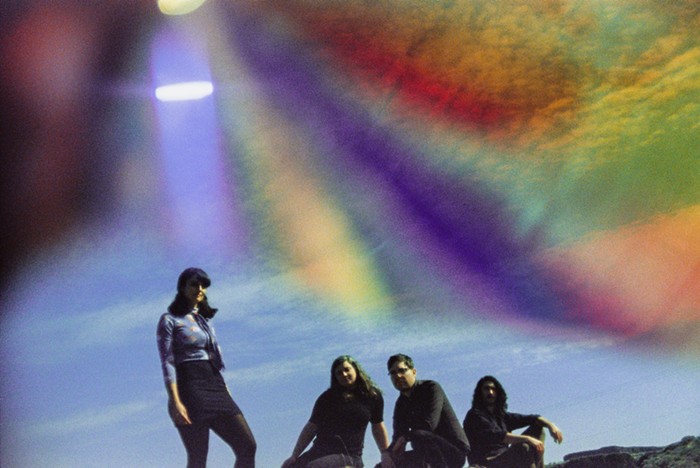Very few rock bands in 2018 can take a five-year hiatus from releasing music and touring and then fill all 2,800 seats in the Paramount Theatre. But the English-Irish quartet My Bloody Valentine pulled off that feat, proving against the odds that an innovative group with no stage presence, no label, and no hits since 1992 can still draw large crowds despite going dormant for half a decade.
How is this happening?
Well, for some fans, MBV were amazing from their mid-'80s inception. Their early releases—The New Record by My Bloody Valentine, Strawberry Wine, Sunny Sundae Smile, Ecstasy—would never be mistaken for groundbreaking, but their revved-up, buzz-saw-textured noise-rock that huffed the Jesus & Mary Chain's fumes for inspiration (sans the lyrical nihilism) still tantalizes. Those fledgling MBV records also jangled prettily in a way that would please any C86 cassette fans. They're full of youthful, agile pop songs to frolic in the flowers to, but nothing mind-expanding.
The group's naively charming 1985 to 1987 phase has its champions, but things really got interesting in 1988. That was the year MBV supernova'd into something wholly other, leaving 99 percent of the rock world to seem suddenly, woefully earthbound and outmoded.
On the Feed Me with Your Kiss and You Made Me Realise EPs as well as the Isn't Anything LP, it felt as if guitarists/vocalists/lyricists Kevin Shields and Bilinda Butcher had ingested the most potent superfoods and psychedelics since their last batch of material. (Not to slight bassist Debbie Googe and drummer Colm Ó Cíosóig, who form a formidable rhythm section.) These wilting introverts had blossomed into brazen power rockers, who not only retained their flagrant gift for melody but also elevated it into something unearthly and strangely sensual. To call it "shoegaze" is laughably inadequate—unless the shoes in question are platform boots the size of Marshall stacks.
With 1991's Loveless, MBV took another Bob Beamon–like leap into the unprecedented. Never had rock sounded so enveloping yet also so ghostly. Shields had mastered his technique of extreme pitch bending by loosening his guitar's tremolo arm and deploying alternate and open tunings. These maneuvers enabled him and Butcher to attain new timbres by radically warping chords, lending their melodies a blurred color-wheel sensation and a stretched-taffy-like consistency.
Bands like Chrome, Cocteau Twins, and Sonic Youth had been moving toward such outward-bound states, but MBV definitively took guitar reinvention to heretofore astronomical heights—all the while forging melodies that stuck in your mind like weird erotic dreams. Legions of disciples have tried to surpass MBV's unique mutations, but none have succeeded.
While the 2013 comeback album m b v may have landed with an anticlimactic thud, it still contains some stellar material. It proved beyond a doubt that it's not easy to follow up rock's last paradigm-shifting opus.
Now with Shields threatening new MBV material (don't hold your breath, though), and a rich catalog of world-historical music to plunder, this appearance at the Paramount should not be missed by anyone interested in transcendent rock.




















